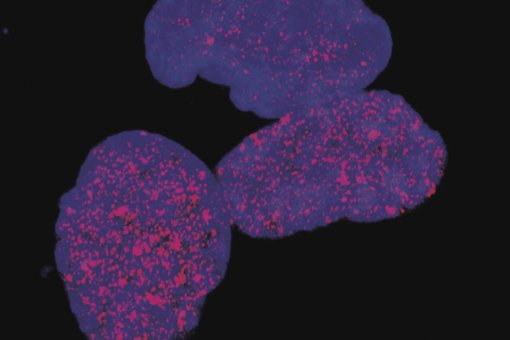Images
Contact

Research has been conducted on the genes of the parasite that play a role during the invasion of red blood cells.
Plasmodium falciparum is responsible for the most severe forms of human malaria. Invasion of host red blood cells is an essential step of the complex life cycle of this parasite. During the process of invasion, P. falciparum, which appears in the stage of a “merozoite”, is exposed to antibodies from the immune system. Consequently, the proteins of the merozoite that interact with red blood cells are a possible weak point, and thus a very clear target to develop vaccines. Alfred Cortés, an ICREA researcher working at IRB Barcelona and an expert in molecular parasitology, together with researchers from the National Institute for Medical Research (NIMR) in London, have discovered that the parasite has the ability to switch on and off the expression of some of the proteins it uses to enter its victim’s red blood cells. The researchers believe that this ability makes the parasite more adaptable when attempting to invade the cells. The study is published in Friday’s issue of Plos Pathogens, the scientific journal with the greatest impact on the field of Parasitology.
30 genes are know to be involved in the process of invasion. Now, the scientists have found that P. falciparum can activate and deactivate the expression of 7 of these genes (and their corresponding proteins) without compromising the parasite’s ability to enter normal or modified red blood cells. According to Cortés, this suggests that the varied expression of these genes may help the parasite to escape the host organism’s immune responses, although the researcher points out that this is yet to be confirmed.
The researchers discovered that the silencing mechanism happens at the epigenetic level, meaning that the parasite stops expressing a certain gene without changing the underlying genetic information, and that the mechanism is flexible, adaptable and easily reversible. This means that the parasite can re-express the proteins relatively easily when infecting another individual or silence them again in a different host, explains Cortés. “We are talking about a very sophisticated adaptation system to the host and our challenge is to find out how this mechanism works at molecular level; that is, we need to figure out which specific epigenetic modifications are associated to activity or to silencing”. Another immediate objective is to find out how many of the 30 genes involved in the invasion of red blood cells are active or inactive in parasites found in nature. “Thanks to this study we have been able to identify 7 genes in 4 different genetic families that may be silenced in a specific P. falciparum strain; we suspect, however, that other genes may also be silenced, and we’ll follow this up with studies on wild strains of the parasite”, concludes Cortés.
The scientist, who leads a research line in molecular parasitology in the Genetic Translation Laboratory at IRB Barcelona, emphasises that this study has also revealed that none of these proteins acting on its own would be a suitable candidate to develop a vaccine because the parasite will still succeed in invading the red blood cell to continue its life cycle”. Researchers like Alfred Cortés believe that more insight into the biology of this parasite will allow us to design vaccines with a high likelihood of success.
Reference paper:
Epigenetic Silencing of Plasmodium falciparum Genes Linked to Erythrocyte Invasion
Cortés A, Carret C, Kaneko O, Yim Lim BYS, Ivens A and Holder AA
PLoS Pathog 3(8): e107 doi: 10.1371/journal.ppat.0030107(2007)
IRB Barcelona
El Instituto de Investigación Biomédica (IRB Barcelona) trabaja para conseguir una vida libre de enfermedades. Desarrolla una investigación multidisciplinar de excelencia para curar el cáncer y otras enfermedades vinculadas al envejecimiento. Establece colaboraciones con la industria farmacéutica y los principales hospitales para hacer llegar los resultados de la investigación a la sociedad, a través de la transferencia de tecnología, y realiza diferentes iniciativas de divulgación científica para mantener un diálogo abierto con la ciudadanía. El IRB Barcelona es un centro internacional que acoge alrededor de 400 científicos de más de 30 nacionalidades. Reconocido como Centro de Excelencia Severo Ochoa desde 2011, es un centro CERCA y miembro del Barcelona Institute of Science and Technology (BIST).



